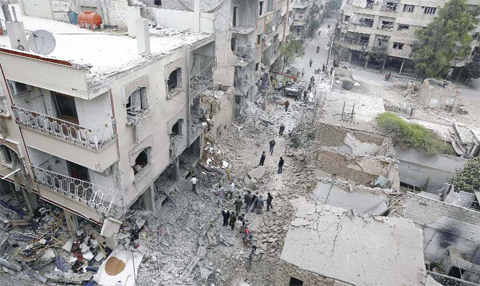 DOUMA, Syria: Syrians inspect damaged buildings following an air strike by Syrian government forces in this rebel-held area east of the capital Damascus. — AFP
DOUMA, Syria: Syrians inspect damaged buildings following an air strike by Syrian government forces in this rebel-held area east of the capital Damascus. — AFPBEIRUT: Syria's main political opposition body and representatives of the armed opposition have not been invited to international talks on the country's war, an opposition politician and a rebel leader said. The Syrian government in Damascus has meanwhile yet to issue any official comment on the meeting in Vienna today that will bring together about a dozen countries including Saudi Arabia and Iran, which back opposing sides in the conflict. The Syrian opposition has objected to Iran's participation in the talks - the first time it has attended such a meeting on Syria - because of its military support for President Bashar Al-Assad.
George Sabra, a member of the Syrian National Coalition, told Reuters the failure to invite Syrians showed a "lack of seriousness". Asked whether the coalition had been invited to the talks, he said: "That didn't happen." "It is a big weak point in the meeting, because it will discuss the issues of the Syrians in their absence." The talks will include regional opponents Saudi Arabia and Iran. "The Saudi regime has committed war crimes and its presence in the multilateral Vienna talks on Syria is dubious and illegitimate," Major General Hassan Firouzabadi, head of Iran's armed forces, was quoted as saying by state news agency IRNA.
Tehran and Moscow have provided crucial support to Assad's government, while his regional opponents including Saudi Arabia, Qatar and Turkey demand his departure. Assad has stuck by his long-held position that "eliminating terrorism" must come first, after Moscow called on Syria to prepare for parliamentary and presidential elections. Assad says all the groups fighting him are terrorists. Bashar Al-Zoubi of the Yarmouk Army, a group affiliated to the Free Syrian Army, told Reuters that representatives of the armed opposition had not been invited to the Vienna meeting.
"Iran is part of the problem and not the solution, and its participation in the meeting will prove that to the world," Zoubi said. "This meeting was accepted by Saudi Arabia and Turkey to expose Iran." The coalition's Sabra reiterated his objection to Iran's participation, saying it could not play a mediation role. "It's officers are fighting every day on Syrian fronts," he said.
A Way 'Out of Hell'
US Secretary of State John Kerry, who arrived in Vienna early yesterday, cautioned that this week's talks would not secure an immediate political solution, but represented the best hope available. "While finding a way forward on Syria will not be easy - it's not going to be automatic - it is the most promising opportunity for a political opening we have seen," Kerry said just before he set off for Austria. "The challenge that we face in Syria today is nothing less than to chart a course out of hell," he added. Kerry was also to meet Austrian Foreign Minister Sebastian Kurz and the UN's envoy on Syria, Staffan de Mistura, in a bid to possibly set up additional meetings with key players later in the day.
Washington is at loggerheads with Moscow over Syria, accusing Russian forces of concentrating their air campaign there on moderate opposition groups opposed to Assad's rule. Moscow says its bombing campaign is targeting Islamic State jihadists and also other "terrorist" groups. But Kerry has stressed that the US and Russia also shared "common ground", arguing that both want "a united, secular Syria" in which citizens can choose their own leader through elections.
After months of failure, efforts to find a breakthrough have gained pace as hundreds of thousands of Syrians have fled their shattered country. Serious divisions remain over when or whether Assad should step down - and four-way Russia-US-Saudi-Turkey talks in Vienna last Friday failed to make a breakthrough. On one side, Russia and Iran are backing Assad's forces on the ground and say Damascus must be helped to defeat "terrorism" before a political process can take shape. On the other, the US and its key regional allies Turkey and Saudi Arabia are supporting groups fighting Assad and insist he must go. French Foreign Minister Laurent Fabius said Wednesday that France and its allies had agreed on the need for a "precise timetable" for Assad's departure. - Agencies










